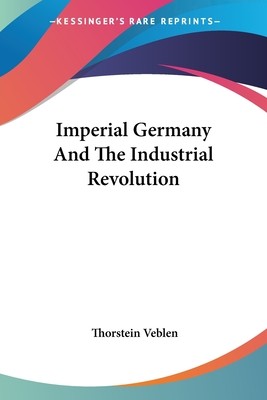
- We will send in 10–14 business days.
- Author: Thorstein Veblen
- Publisher: Kessinger Publishing
- ISBN-10: 1430488263
- ISBN-13: 9781430488262
- Format: 15.2 x 22.9 x 1.9 cm, minkšti viršeliai
- Language: English
- SAVE -10% with code: EXTRA
Reviews
Description
Although published shortly after the outbreak of war, most of Veblen's work on the volume was accomplished well before August 1914. "Imperial Germany and the Industrial Revolution" is nonetheless a remarkably prescient anticipation of Germany's role in bringing on the Great War, as also of the horrors that were to arise in the decades after it. Yet, although the modern reader cannot help but be taken by the author's prescience on those matters, this is not the subject of the work. Rather, it is in large part a study of the divergencies in cultural and historical development between the English-speaking (including the American) and the German-speaking peoples, and of the consequences this produced in economic and social spheres. Suppressed by war censors, Imperial Germany was again released after the war, and has assumed a place as a major contribution to economics and sociology alike.
Veblen's erudition and broad range of interests makes this work a treasure trove of fascination for the curious intellect. Beginning in his first chapter with a discussion of the current state of knowledge of Baltic archaeology, he ranges over the ages in quest of the sources of the Germanic culture and its later offshoot, the English. A trenchant description of contemporary small town America, drawing upon Veblen's own experience as the son of an immigrant Norwegian family in Minnesota, is another treat to be tasted. Not to be missed, this portrait of the American Babbit (before Sinclair Lewis had conceived his character) is found in Supplementary Note IV at the end of the work. Most of the ideas he became famous for in his earlier "The Theory of the Leisure Class" are well summarized and expounded in this work as well.
The comments on the book have scarcely been altered by time. Charles A. Beard noted that "Veblen wrote for the centuries, not for the days, and his Imperial Germany ranks with his immortal Theory of Business Enterprise." Wesley C. Mitchell, reflecting on the book during World War II, wrote that "the natural causes that made Imperial Germany efficient are still at work under the Nazi regime, and the forecast that proved sound once may do so again." Lewis Mumford called Imperial Germany "still the best picture of the residual barbarisms in German civilization; the soil out of which Nazism grew."
This beautifully crafted edition, reprinted by special arrangement with Viking Press, includes an introduction, written in February 1939 by Joseph Dorfman of Columbia University.
EXTRA 10 % discount with code: EXTRA
The promotion ends in 23d.14:45:46
The discount code is valid when purchasing from 10 €. Discounts do not stack.
- Author: Thorstein Veblen
- Publisher: Kessinger Publishing
- ISBN-10: 1430488263
- ISBN-13: 9781430488262
- Format: 15.2 x 22.9 x 1.9 cm, minkšti viršeliai
- Language: English English
Although published shortly after the outbreak of war, most of Veblen's work on the volume was accomplished well before August 1914. "Imperial Germany and the Industrial Revolution" is nonetheless a remarkably prescient anticipation of Germany's role in bringing on the Great War, as also of the horrors that were to arise in the decades after it. Yet, although the modern reader cannot help but be taken by the author's prescience on those matters, this is not the subject of the work. Rather, it is in large part a study of the divergencies in cultural and historical development between the English-speaking (including the American) and the German-speaking peoples, and of the consequences this produced in economic and social spheres. Suppressed by war censors, Imperial Germany was again released after the war, and has assumed a place as a major contribution to economics and sociology alike.
Veblen's erudition and broad range of interests makes this work a treasure trove of fascination for the curious intellect. Beginning in his first chapter with a discussion of the current state of knowledge of Baltic archaeology, he ranges over the ages in quest of the sources of the Germanic culture and its later offshoot, the English. A trenchant description of contemporary small town America, drawing upon Veblen's own experience as the son of an immigrant Norwegian family in Minnesota, is another treat to be tasted. Not to be missed, this portrait of the American Babbit (before Sinclair Lewis had conceived his character) is found in Supplementary Note IV at the end of the work. Most of the ideas he became famous for in his earlier "The Theory of the Leisure Class" are well summarized and expounded in this work as well.
The comments on the book have scarcely been altered by time. Charles A. Beard noted that "Veblen wrote for the centuries, not for the days, and his Imperial Germany ranks with his immortal Theory of Business Enterprise." Wesley C. Mitchell, reflecting on the book during World War II, wrote that "the natural causes that made Imperial Germany efficient are still at work under the Nazi regime, and the forecast that proved sound once may do so again." Lewis Mumford called Imperial Germany "still the best picture of the residual barbarisms in German civilization; the soil out of which Nazism grew."
This beautifully crafted edition, reprinted by special arrangement with Viking Press, includes an introduction, written in February 1939 by Joseph Dorfman of Columbia University.


Reviews